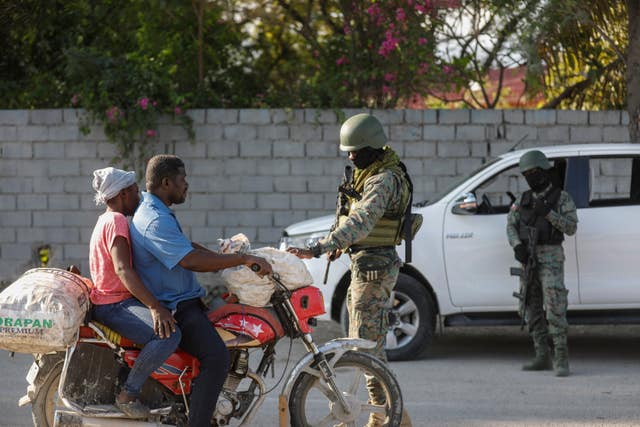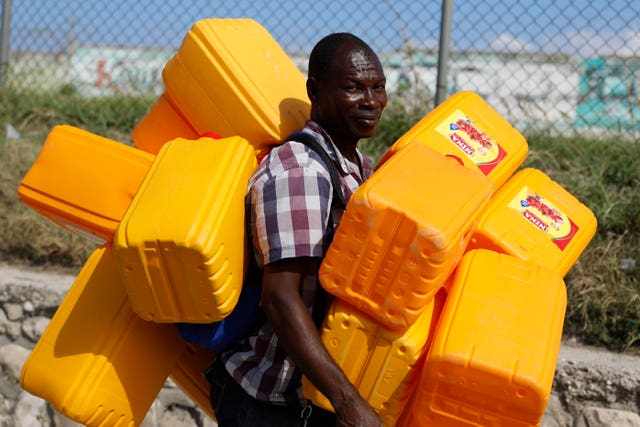Haiti’s government is extending a state of emergency and night-time curfew to try to curb violent gang attacks that have paralysed the capital of Port-au-Prince amid a fierce political battle for power.
An initial three-day curfew was announced over the weekend but gangs have continued to attack police stations and other state institutions at night as Haiti’s National Police struggles to contain the violence with limited staff and resources.
The attacks began a week ago shortly after embattled Prime Minister Ariel Henry agreed to hold general elections in mid-2025 while attending a meeting of Caribbean leaders.

Mr Henry is currently in Puerto Rico, where he was forced to land on Tuesday after the armed groups laid siege to the international airport, preventing him from returning.
Scores of people have died in the recent attacks including several police officers.
The violence has also left more than 15,000 people homeless, in addition to some 300,000 Haitians who lost their homes to gang wars in recent years.
In addition, there were reports that gangs on Thursday looted shipping containers filled with food at the main port in Port-au-Prince, raising concerns that provisions in the capital and elsewhere would dwindle quickly.
“If we cannot access those containers, Haiti will go hungry soon,” said Laurent Uwumuremyi, Haiti director for Mercy Corps.
The operator of the port, Caribbean Port Services SA, said that it was suspending all operations because of “malicious acts of sabotage and vandalism”.
UN spokesman Stephane Dujarric said the insecurity has forced the World Food Programme to suspend its maritime transport service, which is currently the only means of moving food and medical supplies for aid organisations from Port-au-Prince to other parts of the country. Two dozen trucks with equipment, medical supplies and food are stuck at the port in Port-au-Prince.
He also said the UN special envoy for Haiti, Maria Isabel Salvador, is calling for the immediate deployment of a UN-backed force “to prevent the country from plunging even further into chaos, as gang violence in Haiti has reached unprecedented levels”.
Ms Salvador remains in close contact with the prime minister, the government and other parties across the political spectrum “to encourage a peaceful and constructive inter-Haitian dialogue to promote a nationally-owned political solution to this crisis” Mr Dujarric said.
A US defence official said a Marine Corps Fleet Anti-terrorism Security Team, or FAST team, is being deployed to Haiti to protect the US Embassy.
“The people with the guns are essentially the current arbiter of Haitian politics,” said Robert Fatton, a Haitian politics expert at the University of Virginia. “The gangs have won the battle so far.”
“The country is falling apart, and everyone is watching,” said Mr Fatton, who criticised the US government for not taking action more than two years ago and lamented the current state of Haiti. “I am dumbfounded. I thought I had seen everything.”

Gunfire still echoed in parts of Port-au-Prince on Thursday, with blazing tyres blocking some areas as people demanded new leaders for the battered country.
Schools and businesses remained closed but calm returned to a handful of neighbourhoods that saw some stores and banks open under a limited schedule.
Germain Andre, a 40-year-old shop owner who sells rice, oil, beans, milk and other basic goods, said he is having trouble finding provisions given dwindling food supplies across Port-au-Prince as people move around in fear.
“Travelling is very scary,” he said, noting that armed groups have stopped cars. “No one is secure. Everyone is scared of each other now. We don’t know if they’re gang members.”
On Wednesday, Linda Thomas-Greenfield, the US ambassador to the United Nations, said the US has asked Mr Henry to “move forward on a political process that will lead to the establishment of a presidential transitional council that will lead to elections”.
Shortly afterward, US State Department spokesman Matthew Miller echoed her remarks, saying Mr Henry “needs to expedite the transition to empowered and inclusive governance”.
Mr Henry has not made any public comments since the gang attacks began last week.
On Thursday, Guyanese President Irfaan Ali said Caribbean leaders have been working around the clock to help find a political consensus to alleviate Haiti’s crisis.
“It is indeed a distressing situation for the region, but we have a responsibility to do everything we can do to enable the Haitian people to find a consensus and to find a path that is Haitian-led and Haitian-owned in bringing together a level of stability and normalcy that the Haitian people so richly deserve,” he said.




Comments: Our rules
We want our comments to be a lively and valuable part of our community - a place where readers can debate and engage with the most important local issues. The ability to comment on our stories is a privilege, not a right, however, and that privilege may be withdrawn if it is abused or misused.
Please report any comments that break our rules.
Read the rules hereLast Updated:
Report this comment Cancel